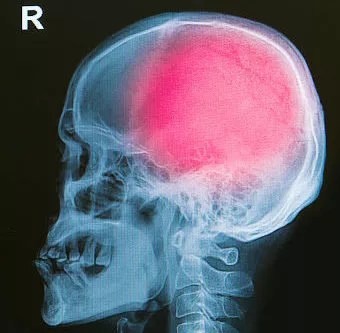Important Warning Signs & Symptoms of a Head Injury After an Accident

If you’ve hit your head, it’s likely you’re in pain and annoyed. However, if you’re experiencing other symptoms, even if it’s a few hours or days after your accident, you could have experienced a concussion or another brain injury.
Even though concussions are frequently described as “mild traumatic brain injury” (mTBI), there’s nothing mild about them. A concussion can have serious, long-term consequences if left untreated, including permanent brain damage. For this reason, it’s vital to know the signs and symptoms of a traumatic brain injury so you can recognize them when necessary.
What Is a Brain Injury?
Any time the head is hit with force, there is a risk of the victim experiencing a brain injury. A traumatic brain injury (TBI) is caused when the head is hit suddenly with a strong force, or when an object penetrates the skull and enters the brain.
However it happens, a brain injury can result in long-lasting, debilitating side effects. Not only can a brain injury cost thousands in hospital bills immediately after the injury, but it can cause the victim to be unable to work or require constant care for the rest of their life. It’s also likely that they experience a greatly reduced quality of life.
Signs and Symptoms of a Brain Injury
If you or someone else have hit their head, be on the lookout for outward signs and inward symptoms that could indicate a concussion or more serious brain injury. Many of the following symptoms will appear soon after a concussion, but some could take hours or even days to present. For this reason, even if you think you’re fine after hitting your head, you should always be examined by a medical professional. Being aware of potential symptoms of a head injury and making sure they are properly addressed can mean the difference between life and death.
Observed Signs of Concussion
Watch for the following outward signs that someone has experienced a concussion after hitting their head:
- They can’t recall events before or after the fall
- They appear dazed or stunned
- They are suddenly forgetful, confused, or unsure
- They move clumsily
- They speak or answer your questions slowly
- They lose consciousness, no matter how brief that loss is
- Their mood, behavior, or personality suddenly changes
Reported Symptoms of Concussion

Victims of brain injuries can also complain about certain symptoms. As you interact with the victim of a hit to the head, stay alert for the following symptoms they could report:
- A headache or head pressure
- Nausea or vomiting
- Problems with balance or dizziness
- Double vision or blurry vision
- Sensitivity to light or noise
- Confusion or concentration problems, or trouble remembering
- Feeling strange or “down”
Symptoms in Children
If your child was injured during an accident and potentially received a head injury, they could be at significant risk of further complications. Because infants and young children are unable to communicate their symptoms, be especially vigilant for the following symptoms in non-verbal children, as well as the above:
- A change in nursing or eating habits
- Unusual irritability
- Persistent crying without consolation
- A change in their attention span
- A change in their sleep habits
- Seizures
- Drowsiness
- A loss of interest in their favorite things
Main Accidental Risk Factors of Head Injuries
A traumatic head injury is usually caused by a hard blow to the head or some other sudden, strong force. Depending on the nature of the injury and the forces involved, the degree of damage can vary greatly. Some accidents are more likely to cause brain injuries than others:
- Slips and falls are the most common cause of traumatic brain injury overall. However, they’re particularly dangerous for older adults and young children.
- Traffic accidents involving cars, motorcycles, buses, bicycles, trucks, and pedestrians cause thousands of traumatic brain injuries every year.
- Violent crimes, including domestic violence, gunshot wounds, and assaults also cause brain injury. Shaken baby syndrome is a serious type of traumatic brain injury caused by violent shaking, and tragically happens many times each year.
- Sports injuries can also cause brain damage, whether from football, soccer, boxing, hockey, or other full-impact sports. Repeated brain injury can also cause chronic traumatic encephalopathy (CTE), a serious condition that’s been noted in a number of professional athletes.
- Combat injuries including explosions, penetrating wounds such as gunshot wounds, falls, and blows to the head from shrapnel.
What to Do If You’ve Suffered a Brain Injury

Suffering a brain injury is one of the most traumatic events you can face. If you or a loved one has been the victim of a brain injury due to someone else’s negligence or wrongdoing, you could be eligible for financial compensation.
Call the Louisiana personal injury lawyers at Gordon McKernan Injury Attorneys for a free consultation about your case. A dedicated lawyer will get started right away, collecting evidence, interviewing witnesses, filing paperwork, and preparing for trial. Call us at 888.501.7888 today to begin your path to healing.

